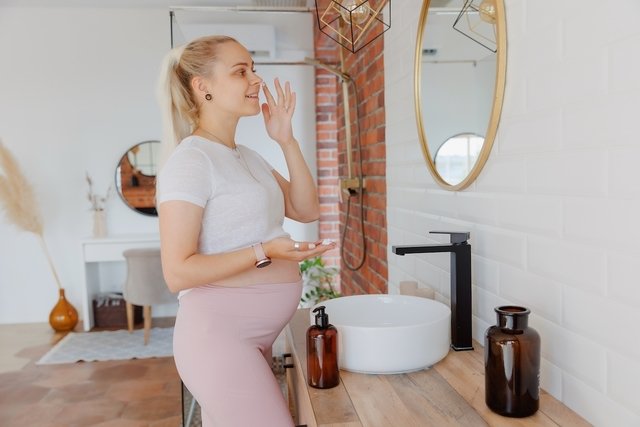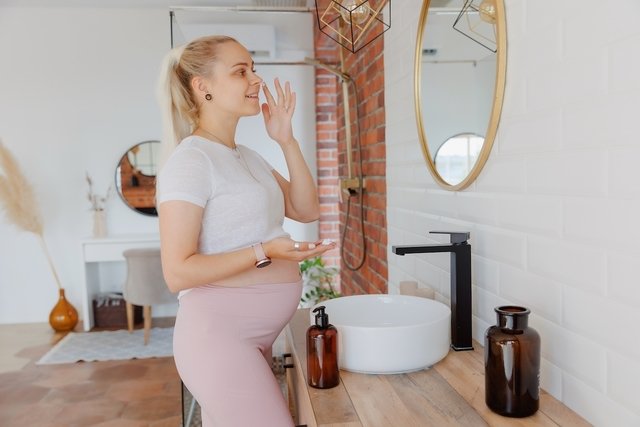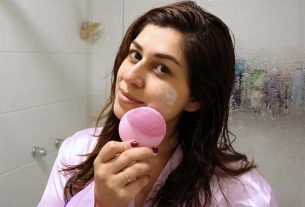Pimples during pregnancy occur due to the normal hormonal changes during pregnancy, which can increase the oiliness of the skin and favor the production of sebum and the formation of pimples.
During pregnancy, pimples appear more frequently on the face, chest and back, as these are places where there is a greater concentration of sebaceous glands, and to combat them it is recommended to wash the skin with neutral or mild soap.
Pimple treatment during pregnancy is carried out by an obstetrician or dermatologist, and involves daily skin cleansing or the use of topical products that are safe for use during pregnancy.

Why pimples appear during pregnancy
Pimples during pregnancy appear due to the increased production of estrogen and progesterone, which are normal during pregnancy to create conditions for the baby to develop inside the uterus.
These hormonal changes favor the production of sebum and increased skin oiliness, accumulation of oil and dead cells at the base of the follicle, leading to obstruction and inflammation, and the development of pimples.
The appearance of pimples during pregnancy is generally more intense in the first trimester and tends to decrease at the end of pregnancy, after childbirth and during breastfeeding, as the concentration of hormones decreases, also controlling the oiliness of the skin.
What to do
To combat pimples during pregnancy, it is recommended:
- Don’t use excessive makeupand always remove it correctly because it can accumulate and clog the skin pores;
- Wash the skin with neutral or mild soaptwice a day (morning and evening), thus preventing blackheads and pimples from forming;
- Apply a tonic lotion, without alcohol or acidsafter washing and drying your face;
- Apply an oil-free moisturizer and non-comedogenic in small amounts on the face;
- Do not expose yourself to the sun excessivelyas UV radiation can accelerate the formation of pimples
- Apply non-greasy sunscreen dailyat least FPS 30;
- Prefer foods with whole grains and rich in omega-3such as salmon and sardines, as they help regulate blood sugar and reduce skin inflammation, which causes pimples.
Furthermore, it is important to be careful with your diet, avoiding fatty or high-sugar foods, and keeping your body hydrated by drinking at least 8 glasses of water per day. See what you should eat to eliminate pimples.
How the treatment is carried out
The treatment of acne during pregnancy must be carried out under the guidance of an obstetrician or dermatologist, since most medications, even topical ones, are contraindicated as they can affect the baby’s development.
Therefore, some topical products are considered safe during pregnancy and may be recommended by your doctor, such as azelaic acid, or some antibiotics, if the pimples are severe.
It is important for pregnant women to only use medicines recommended by their doctor, and not to use medicines on their own throughout the pregnancy and, especially in the first trimester, which is the phase of development and formation of the baby’s main organs and systems.
Make an appointment with a dermatologist in the nearest region:
Taking care of your health has never been easier!
What not to use
During pregnancy, the pimple products that are completely contraindicated include:
- Topical retinoids, such as tretinoin, adapalene, or tazarotene;
- Oral retinoids, such as isotretinoin (Roaccutane), acitretin or etretinate;
- Oral antibiotics, such as doxycycline, tetracycline, minocycline, sulfamethoxazole+trimethoprim or fluoroquinolones;
- Topical salicylic acid.
Furthermore, other treatments with acids, peeling, laser and radiofrequency are also contraindicated during pregnancy.
Home treatment for pimples during pregnancy
In addition to adopting some practical everyday measures, some homemade solutions can also be adopted to treat acne during pregnancy, such as:
- Drink 1 glass of carrot juice daily, which is rich in vitamin A and reduces the appearance of pimples;
- Drink 1 glass of natural raspberry juice a day, as it is rich in zinc which helps to reduce inflammation of the skin;
- Wash your face daily with cold chamomile tea. See how to prepare chamomile tea for your face;
- Apply a homemade rice mask with honey, as it reduces skin inflammation and maintains good hydration.
These home treatments achieve good results for mild acne, and can be used freely during pregnancy as they do not harm the baby. See other home remedies for pimples.

Sign up for our newsletter and stay up to date with exclusive news
that can transform your routine!
Warning: Undefined array key "title" in /home/storelat/public_html/wp-content/plugins/link-whisper-premium/templates/frontend/related-posts.php on line 12
Warning: Undefined array key "title_tag" in /home/storelat/public_html/wp-content/plugins/link-whisper-premium/templates/frontend/related-posts.php on line 13




